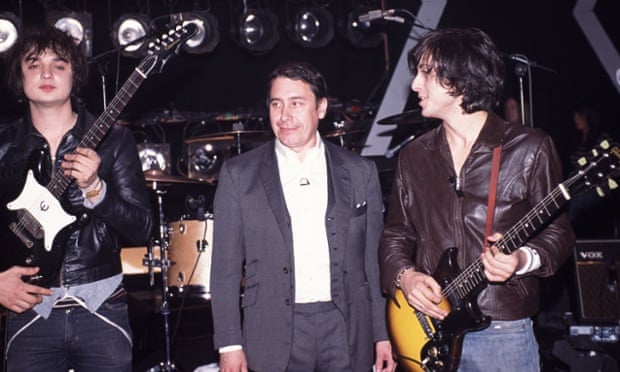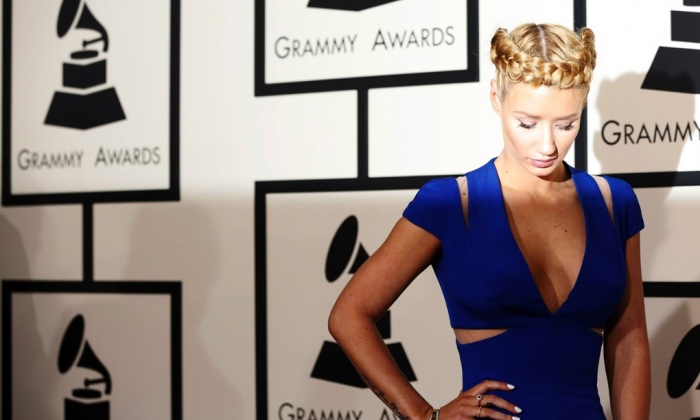A pizza delivery guy allegedly passed the rapper’s phone number to family, but when the dividing line between fans and stars is so blurred, what do you expect?
Iggy Azalea may not have won a Grammy this year, but she did scoop up the lesser-known award for Worst Pizza Delivery Experience of 2015. The Aussie rapper apparently dialled Papa John’s from backstage at the awards show, no doubt expecting some kind of combination of bread, tomato and cheese to arrive. Instead, the pizzeria dished out a brand-new set of stalkers after the delivery guy decided to share Azalea’s cellphone number with his family.
“Hello is this iggy azalea my brother had delivered something from Papa John’s to u and he gave me the number on Friday night i am ur number one fan call me back please!” was the first message to appear, swiftly followed by: “Is this u please answer u r my idol.”
Azalea responded with a series of furious tweets regarding the data breach, and her rage was hardly placated by Papa John’s decision to tweet something wacky back and hope it passed for damage limitation (as seems to be the trend these days; after all, who cares about a company’s approach to your personal information when they can show off a passing knowledge of pop culture?). But is the fact her number ended up being passed around really that surprising given the way artist-fan relationships have changed over the past decade?
Back in the 1960s, unless you were a groupie cherry-picked from the crowd for special attention, your contact with bands was most likely restricted to joining fanclubs and writing terrifying letters in red ink. Punk aimed to obliterate the widening gap between lofty artist and fan, as did the 1980s DIY scene in which fans would let touring bands kip on their bedroom floor. But the real sea change came at the turn of the century when bands such as the Libertines and the Others were able to marry these punk ideals with the technology required to put them into practice. What fans loved about these bands wasn’t just the music, but the fact they had a seemingly 24-hour hotline to the group – you could chat with them on message boards, or turn up at their flats for acoustic performances. As Richard Day, a diehard Libs fan back in the day, once recalled to me:

Others frontman Dominic Masters made a point of being even more accessible – doling out his cellphone number to fans so they could chat with him whenever they wanted. Anytime I met with him, often at his flat which seemed to be decorated with stray fans lying around various rooms, his phone would constantly be beeping with messages from members of the band’s wild fanbase dubbed the 853 Kamikaze Stage-Diving Division.
But it wasn’t just east London bands who were cottoning on to the way bands could improve the relationship with their fans. Southampton psychedelicists the Delays once set up their amps in a superfan’s front room for a full-powered band set. The noughties was the decade where bands and fans truly began to interact, and so it made sense when this notion left the indie and punk spheres to become embraced on a global scale, from Lady Gaga’s Little Monsters – who shared a pride in being different – to Taylor Swift inviting wild-eyed devotees to appear on her album-launch webcasts or dance in her videos.
In the age of social media, where pop stars compete to make themselves as accessible as possible online – doing follow sprees, joining conversations or offering prizes to followers – the difficulty is not how to interact with your fans but how to retain any sense of mystique. If a fan wants to say something to a celebrity, they can do it instantly, and the barriers for doing so in a polite way have long since been obliterated. The red-ink letters are still being written, it’s just that nowadays they are landing in notification bars.
It no longer seems intimidating to contact a pop star, and why should it when pop stars are so often reaching out for exactly this kind of contact? Musicians funding their albums through Kickstarter, for example, are regularly throwing in the kind of access 60s fans would have dreamed of – the chance to add lyrics to a record, for instance, or the slightly creepy opportunity to go on a dinner date with a band. In a world where we are encouraged to interact with celebrities as if they are our friends, can we really be shocked when the odd pizza delivery guy oversteps the line?

No comments:
Post a Comment